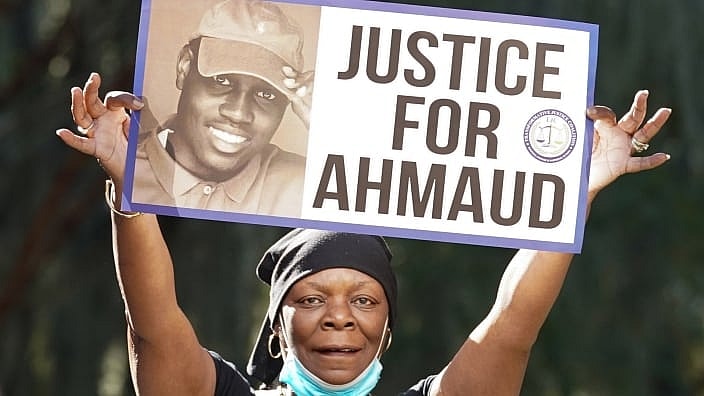The slow-moving jury selection for the trial of the trio accused of murdering Ahmaud Arbery is centering on how potential jurors in Brunswick, Georgia, feel about race.
The fourth day of jury selection concluded on Thursday at the Glynn County Courthouse, and the state and defense asked a pool of candidates their views about race, The Atlanta Journal-Constitution reported. Attempting to create a pool of 64 people from whom a jury can be chosen, they wanted to know if potential jurors believed Arbery would’ve been killed if he was white.

The 25-year-old Black man was chased and fatally shot on Feb. 23, 2020, while jogging, after being targeted by white father and son Greg McMichael and Travis McMichael. The McMichaels, accompanied by their white neighbor, William “Roddie” Bryan, pursued Arbery in their truck, believing he was responsible for a string of robberies in the Satilla Shores subdivision. Bryan captured the incident on cellphone video.
It took more than two months for the men to be charged, following outrage after captured video of Arbery’s shooting leaked.

Each defendant is facing a total of nine counts. The McMichaels and Bryan are charged with one count of malice murder, four counts felony murder, two counts aggravated assault, one count false imprisonment and one count criminal attempt to commit false imprisonment. A 12-member jury will decide if they are guilty or not.
Locating that completely impartial mix of residents in Brunswick has apparently proven difficult. So far, 23 potential jurors have qualified through the screening process in the high-profile case.
According to The AJC, Juror No. 221 declared Arbery’s death was a “hate crime,” and the “system is broken.” She also took part in some area Black Lives Matter protests and attended an Arbery vigil.
“A young man was inappropriately shot walking around a neighborhood,” she wrote on her juror questionnaire. “Looked like a citizen’s arrest that went horribly wrong.”
The woman maintained that she would be able to remain neutral, yet when asked by one of the McMichael attorneys if she believed she would’ve been killed if it had been her, not Arbery, in the neighborhood, she responded clearly.
“I’m a white old lady,” she replied. “It’s my race, my age, gender. … That’s why I think they wouldn’t come after me if I was walking the neighborhood.”
Juror No. 218 wrote on her questionnaire that she was believed Arbery was killed because of his race. She was asked to leave the courtroom when the slain man’s father and two others entered the courtroom wearing buttons that signaled their support for Black Lives Matter, bearing slogans such as “Make Good Trouble,” in honor of the late Rep. John Lewis.
Superior Court Judge Timothy Walmsley asked Arbery’s father and those with him to remove their buttons. Walmsley expressed admiration for the late Rep. Lewis, but did not want anything to potentially taint the courtroom proceedings.
“I respect the fact this case has garnered a great deal of interest,” Walmsley said, “and a number of movements have been attached to it. I don’t have a problem with that.”
The judge acknowledged that Arbery’s death and subsequent activism “have really opened up a very important discussion. But it’s not a discussion that’s appropriate for this courtroom right now.”
Thursday’s proceedings also signaled support for the McMichaels. Some prospective jurors admitted to knowing the father and son, conceding they could not be impartial.
“I don’t want to be a distraction and be a problem for a case that’s already caused problems in our community,” Juror No. 236 contended, having known the McMichaels for three decades.
This potential juror wanted to avoid an “an appearance of impropriety,” and Juror No. 242 had similar views. He said he has known the McMichaels and Bryan for over 20 years, and they all were members of a local hunting club.
Said Juror 236: “I just feel like I know them too good.”
Have you subscribed to the Grio podcasts, ‘Dear Culture’ or Acting Up? Download our newest episodes now!
TheGrio is now on Apple TV, Amazon Fire, and Roku. Download theGrio today!

